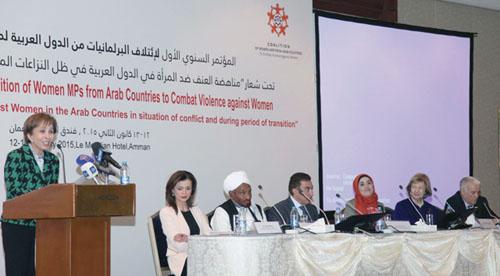You are here
Parliamentarians call for criminalising domestic violence
By Laila Azzeh - Mar 27,2014 - Last updated at Mar 27,2014

AMMAN — The Domestic Violence Law should be amended to include a clear definition of violence against women in order to criminalise it, parliamentarians said on Thursday.
Despite being considered a major stride in recognising domestic violence, the law, endorsed in 2008, suffers from many loopholes that fail to protect vulnerable women, according to members of the Forum of Jordanian Parliamentarian Women.
During a workshop on domestic violence, held by the Westminster Foundation for Democracy (WFD), they noted that abuse victims could also experience a form of violence when reporting their assaults.
“It is not enough that it is considered a very courageous and difficult decision for battered women to speak out, but they might also be at risk when filing a complaint,” said Senator Asma Khader, secretary general of the Jordanian National Commission for Women.
To this end, the Social Development Ministry is training its staff to improve their efficiency in handling domestic violence cases, which currently stand 19,000.
Abdullah Smeirat, the ministry’s deputy secretary general, said the demographic changes witnessed in the Kingdom has amplified violence against women and children.
On the other hand, women are now more aware of their rights and the channels through which they can protect themselves, he noted, citing 33,963 cases of violence reported in 2013, compared to 39 cases in 1998.
Deputy Wafaa Bani Mustafa pointed out that there is no credible data on violence against women in Jordan, due to the absence of an explicit definition of violence, which comes in many forms: physical, sexual, psychological, economic and social.
Participants at the two-day workshop, attended by parliamentarians and scholars from 10 Arab countries, noted that depriving women of their inheritance and forcing them to take loans on behalf of their spouses are common forms of violence witnessed in the Kingdom nowadays.
Khader said domestic violence has been rising over the past three years, particularly due to the social, economic and political developments surrounding Jordan.
However, participants agreed that the Kingdom has come a long way in protecting women and providing abuse victims with care, including at the legal and service levels.
Lower House Speaker Atef Tarawneh cited efforts to eliminate violence against women, noting that the Kingdom recently joined the “COMMIT” initiative, which calls on world leaders to make concrete commitments to end violence against women and girls by establishing a roadmap for the future.
Dina Melhem, head of the WFD’s programmes in the MENA (Middle East, North Africa) region, said the workshop aims at looking into practices of Arab countries in terms of fighting domestic violence and providing a platform to come up with a holistic strategy to address the phenomenon.
“The workshop comes in sequence to a previous MENA regional workshop that took place in London in late January, where a coalition of Arab women MPs was launched to combat violence,” she said.
At the conclusion of the workshop on Friday, participants are expected to come up with a protocol on domestic violence to serve as reference for policy makers.
The WFD is implementing two regional programmes; the first focuses on enhancing women MPs’ capacity and the second supports connections between them and think tanks.
The initiatives are funded by the UK Foreign and Commonwealth Office and implemented in cooperation with the Arab Inter-parliamentary Union and the Arab Institute for Parliamentary Training and Legislative Studies, according to the WFD.
Related Articles
AMMAN — Women parliamentarians on Monday called for the formation of a cross-house coalition to address women’s issues and work to amend all
Arab Day for Combating Violence against Women was launched on Monday in a bid to bolster regional efforts to eliminate violence and all forms of discrimination against women.
Arab women parliamentarians on Tuesday called for entrenching the culture of liability to protect women from violence, and for media coverage of the phenomenon so it is condemned by the public.













